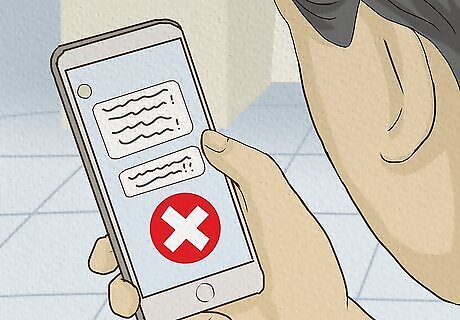
views
- A narcissist will start out by idealizing you: they’ll put you up on a pedestal and worship the ground you walk on.
- Over time, the devaluation stage sets in. This is when a narcissist starts insulting you or trying to control you.
- Once a narcissist can’t get validation from you anymore, they'll either discard you and move on to someone else to repeat the pattern with or restart the pattern with you.
Relationship Cycle

Idealization When you first get into a relationship with a narcissist, they hold you up on a pedestal. They might call you their soulmate, their twin flame, or their knight in shining armor. For weeks (or even months), a narcissist might be planning your future wedding or even naming your future children. At first, you might think this is amazing! You’ve finally found the perfect partner for you. But over time, cracks will start to show, and your partner will move onto the next phase.

Devaluation Slowly but surely, you’ll notice a change within your narcissistic partner. They might start to insult or criticize you more, or make you feel “less-than” them. They might also withhold physical or emotional intimacy or even gaslight you. Over time, these behaviors will escalate, until you can barely remember the honeymoon period in the beginning of your relationship. Gaslighting is when someone manipulates you into doubting your own thoughts or memories. You might hear things like, “That never happened,” or, “Are you sure you’re remembering that right?” Unfortunately, the actions during this cycle can delve into abusive behavior.

Discarding Many narcissists seek out relationships because the attention and validation makes them feel good. When the relationship no longer serves them (which is usually a few months or years in), they will push you away and search for someone else. This stage may also come after you ask for empathy or compromise from a narcissistic partner. Since that would require effort, they’d rather break things off and find someone new. Typically, a narcissistic person will seek someone out to repeat this cycle with in a new relationship. However other times, they'll restart the process over with you, by initiating another round of the "idealization" phase. The average length of time for a narcissistic relationship is about 6 months to 1 year. After that, the narcissist might find it hard to keep up the facade.
Behavioral Patterns

Love bombing Love bombing can be described as doing too much too early in the relationship. Whereas normal partners might wait weeks (or even months) to drop the “L” word, narcissists might proclaim their love for you on your first date. They will use extravagant displays of affection, like gifts, compliments, and grand gestures to draw you in and make you feel like the relationship is perfect. Love bombing is different from a honeymoon period or getting swept up in your emotions. When someone love bombs you, they are intentionally trying to manipulate you into staying with them or falling for them.

Controlling behavior It’s subtle at first, but a narcissist won’t wait long to try and control your every move. Maybe they don’t like your friends, so you stop seeing your pals as often. Maybe they’re “worried about you” walking late at night, so they come pick you up from work every day. Over time, you’ll notice that your life has zeroed in on your partner, and you can’t make a single move without them knowing about it. They might also track your location or tell you what you can and can’t wear or eat.

Pulling away and coming back Just when you thought things were going perfectly, your partner all of the sudden grows cold. After a few days (and some begging) they come back, but the cycle repeats time and time again. This push and pull is a way of keeping you hooked so that you’re constantly vying for their affection.

Constantly seeking sympathy When you’re with a narcissist, you’ll notice that they’re always the victim. Everyone in their lives—their boss, their friends, their parents—are out to get them no matter what. This is because a narcissist’s sense of self-worth is so low, that by painting themselves as the victim in their own story, they can blame everyone else for any shortcomings or flaws they might have.

Never apologizing or accepting blame In a narcissist’s mind, they have zero flaws. You will almost never get an apology out of a narcissist, because they genuinely believe that they’ve done nothing wrong. Even if you present them with solid, concrete evidence of their mistake, “I’m sorry” will never come out of their mouth. Instead, they might shift the blame onto you: “Well, if you had just reminded me, I wouldn’t have forgotten!” or other people: “The cashier checked me out super slowly. It’s his fault that I’m late.”
Signs of Narcissism

Overinflated sense of self-importance One of the key characteristics of a narcissist is their huge ego. A narcissist believes that they’re the most important person in the world, because in their mind, they are. Everyone around them is just a pawn in their own personal game. Conversely, narcissists often have extremely low self-esteem. Their huge egos and low self-worth might seem at odds, but they use their ego to mask their lack of self-confidence.

Feelings of superiority Narcissists tend to look down on the people they consider less-than them. They might refuse to hang out with people who “aren’t successful” or don’t make as much money as them.

Constantly fantasizing about success or fame For many narcissists, their end goals are similar: be hugely successful and get notoriety. It may change depending on the narcissist’s interests, but in the end, most people with narcissistic personality disorder believe that they deserve success.

Taking advantage of others without remorse Narcissists lack empathy for other people. They have no trouble asking for favors or even taking advantage of other people to get what they want. Since they can’t put themselves in someone else’s shoes, they have no reference for how another person might be feeling.

Needing excessive admiration Narcissists thrive off of praise, and they don’t like it when other people get more validation than them. You’ll notice that a narcissist in your life is only happy when they’re getting compliments. If anyone around them (even you, their partner) gets a “good job” or “nice work,” they’ll likely get moody and upset.
Types of Narcissism

Grandiose narcissism Narcissism can look different depending on the person, so if you’re trying to determine whether or not you’re with a narcissist, it helps to familiarize yourself with the 2 categories of NPD. Also called overt narcissism, a grandiose narcissist is almost like a caricature of narcissism. They have a hugely inflated ego, and they’re also overbearing, stubborn, and generally off-putting. Typically, they have high self-esteem which makes them confident and assertive. However, they also tend to overestimate their own intelligence.

Vulnerable narcissism Also known as covert narcissism, vulnerable narcissists tend to be quiet and introverted. They still crave respect and admiration, but their low self-esteem causes them to be passive-aggressive rather than assertive and confident.
Can you have a happy relationship with a narcissist?

It is very difficult to have a fulfilling, loving relationship with a narcissist. While that’s not to say it’s impossible, narcissists have a hard time “seeing” their partners as whole people. Instead, they are more likely to view you as a puzzle piece that fits into their life nicely for now. Experts warn that narcissists cannot give you a loving, happy relationship. It’s just not what they’re built to do.
What to Do If You’re in a Relationship with a Narcissist

Set clear boundaries. Narcissists will try to take advantage of you no matter what. Set clear boundaries around what your partner can and cannot say to you or what behaviors are unacceptable. Then, mention clear consequences that will happen if your boundaries are violated. Always follow through with your threats to let your partner know you’re serious. “If you keep yelling at me, I’m going to walk away, and this conversation will be over.” “If you keep showing up late to our dates, I’m going to rethink this relationship.” “You need to respect me and stop calling me names, or I’m moving out.”

Seek help from a mental health professional. Dealing with a narcissistic partner isn’t easy. If you’re struggling, contact a therapist to help you cope with your feelings and your partner’s behavior. They’ll help you set boundaries for yourself and be in a relationship with a narcissist while still maintaining your own happiness and health.

End the relationship if it’s abusive. You deserve to be in a healthy, happy relationship. If your partner is emotionally or physically abusing you, make a plan to leave the relationship safely. Lean on your friends and family for help as you work through your emotions and find time to heal.
Moving on from a Narcissist

Go no contact with your ex. When a narcissist realizes that you’re leaving for good, they’re going to do anything in their power to get you back. Block your partner on all platforms and do your best to go no contact. The more you can avoid contact with them, the better chance you’ll have of moving on. Your ex will use anything from love bombing (sweet-talking you, complimenting you, promising that they’ve changed) to insults to get you back. If you can avoid contact with them, you can avoid falling back into the trap of a narcissistic relationship pattern.

Practice self-care and focus on your mental health. Getting out of a relationship with a narcissist can be exhausting. Practice self-care by doing something relaxing every day, like mediating or journaling. Over time, this will help you heal and move on.

Don’t expect apologies or remorse. Unfortunately, a narcissist won’t feel the pain of a breakup like you do. They may try to get you back, but they won’t be sorry about their actions that drove you away. Remember that even if they promise that they’re going to change, they don’t truly understand what you’re going through.

Seek out stable, healthy relationships. For some people, the thrill of a relationship with a narcissist is exciting, which keeps drawing them back in. When you decide you’re ready for a relationship again, find someone who is stable and comforting. For now, focus on the relationships in your life (friends, family members) who you can lean on for support. Many experts encourage people recovering from a narcissistic relationship to look for someone “boring.” In terms of a relationship, boring often equals balanced and calm, which is exactly what you need.




















Comments
0 comment